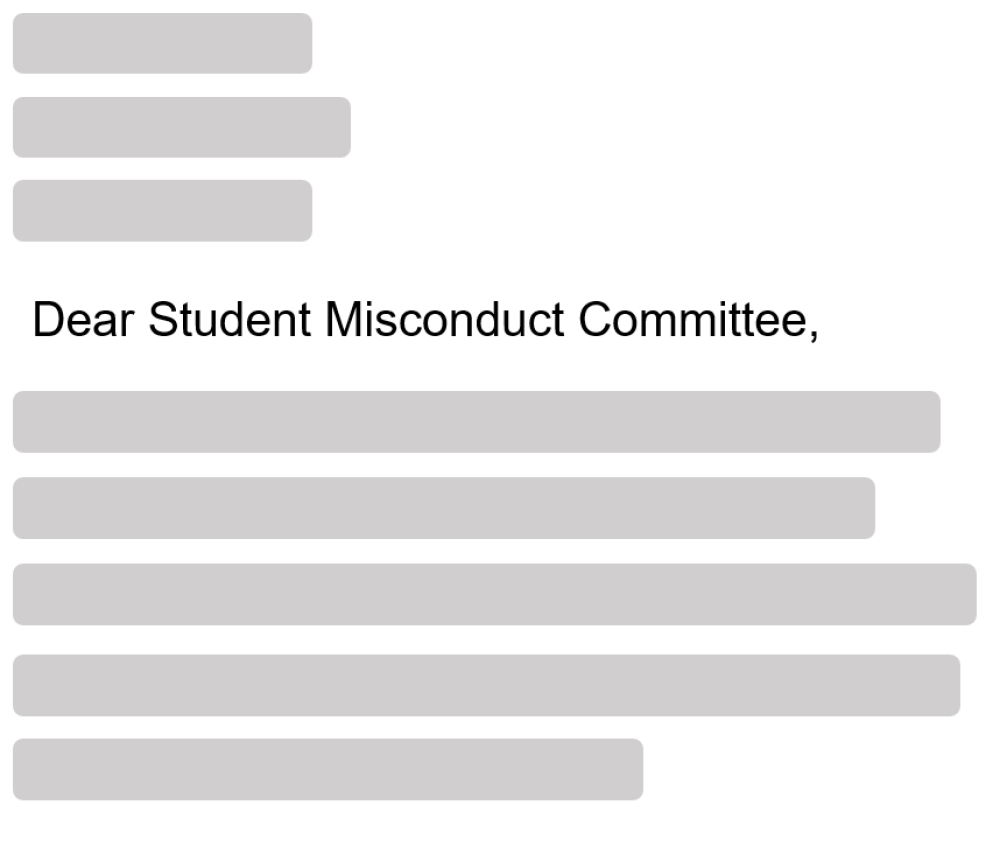If you have received a Student Misconduct allegation and would like support, we're here to help.
What is Student Misconduct?
- Student Misconduct is defined in the Vice-Chancellor Regulations and includes breaches of the Student Code of Conduct. Student Misconduct does not include academic integrity breaches or research integrity standards breaches.
- A list of the types of conduct and behaviours considered to be Student Misconduct can be found in the Vice-Chancellor Regulations (Part 1.4, page 2).
I have received a letter alleging Student Misconduct. What should I do?
Read the allegation letter and evidence carefully. You have an opportunity to respond to the allegation, but you must do this within certain timeframes. You can respond to the allegation and make your case either by written submission, attending a meeting, or both.
The return date for your reply slip and written submission, as well as an indication of your meeting date will be in the allegation letter. On your meeting reply slip you will need to let the Student Misconduct Committee know whether you:
- admit or do not admit the allegation,
- will or will not be sending a written submission,
- will or will not be attending the meeting, and
- if attending the meeting, whether you will be accompanied by a support person.
There will also be an opportunity to decide whether you want witnesses to provide evidence at the meeting and to notify the Committee about this.
It is important to note that if you admit to an allegation, the Committee will find the allegation to be proven. Consider contacting a DUSA Advocate for advice and assistance prior to responding to the allegation.
What happens if I don't respond to the allegation?
- If you do not respond to the allegation the Student Misconduct Committee will have a meeting in your absence using all the evidence it has gathered and will decide the outcome and penalties.
- DUSA strongly recommends you prepare a written submission and send this to the Committee along with any supporting documentation within the set timeframe.
What should I include in my written submission?
- A written submission is a letter, and if relevant, supporting documents.
Can a DUSA Advocate help me with my Written Submission?
- Yes, DUSA Advocates can review your draft written submission and provide feedback before you submit it to the Committee.
- If you would like feedback from an Advocate regarding your written submission. Please allow 1-2 working days for DUSA Advocates to provide feedback.
Should I attend the meeting?
- DUSA Advocates encourage students to attend meetings if possible, either by Zoom, phone or in person.
- We recommend you see a DUSA Advocate for advice about your individual situation.
Can I take someone to the meeting with me?
- Yes, you can take a support person to your meeting. This person can be anyone who is not a practicing lawyer.
- DUSA Advocates often accompany students to meetings. If you want an Advocate at your meeting, please request this as soon as possible.
What happens at a meeting?
- The meeting will happen either by Zoom or in a meeting room on campus.
- Most meetings are attended by a Committee of two or more members. (Note: some cases are heard by a single member committee.)
- You will have the opportunity to talk about your case and the Committee will ask you questions.
- The Committee may call witnesses and question them during the meeting. You may also call witnesses (if you have arranged this prior to the meeting) and question them.
- When the Committee believe they have all the information they need to make a decision, they will ask you (and your Advocate) to leave the room whilst they deliberate.
When will I know the Committee’s decision?
- If you attend the meeting, it is possible you may be told the Committee’s decision on the meeting day. However, the Student Misconduct Committee may need further time to deliberate before making their decision.
- The Committee will email you an outcome letter explaining their decision (and any penalties imposed) within 5 working days of making a decision.
What are the possible outcomes?
- The Committee will determine whether or not student misconduct has occurred. If they find that misconduct has occurred, they may impose outcomes from among those listed in Schedule 1 of the Vice-Chancellor Regulations (page 9).
Will the University keep a record of the allegation?
- The University keeps a confidential central database of student misconduct matters.
Can I appeal the decision or outcome?
- If you disagree with the decision of the Student Misconduct Committee you may appeal the finding of a misconduct and/or the outcomes/ to the University Appeals Committee.
- You have 20 working days from the date of the outcome letter to appeal.
- To appeal you will need to have one or more of the grounds of appeal set by the University.
- You can find out more on our Appeal of a Student Misconduct Allegation webpage.
How can DUSA Advocates help me?
- DUSA Advocates can assist you to understand the allegation, the written submission and meeting process, and the range of possible outcomes.
- DUSA Advocates can review your draft written submission and provide feedback.
- An Advocate can assist you to prepare for your meeting and can accompany you to your meeting as your support person (if given sufficient notice).
- Contact us today to arrange a free appointment.



